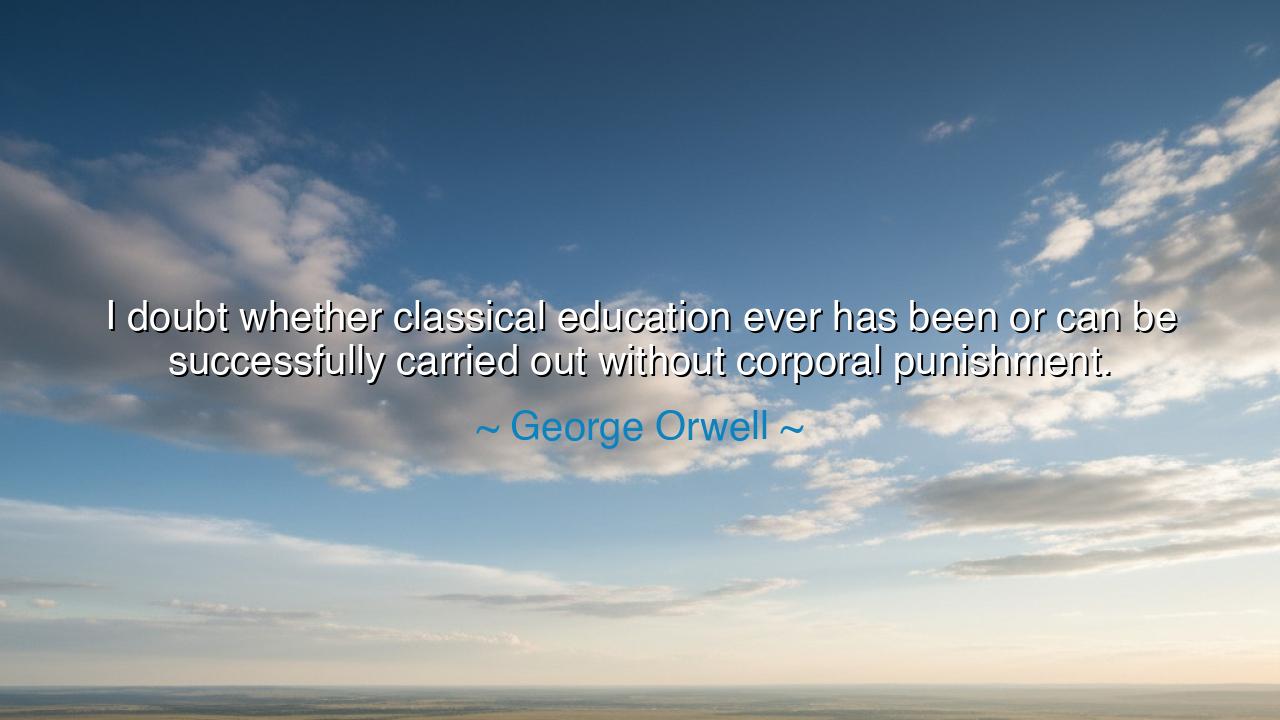
I doubt whether classical education ever has been or can be
I doubt whether classical education ever has been or can be successfully carried out without corporal punishment.






In the words of George Orwell, “I doubt whether classical education ever has been or can be successfully carried out without corporal punishment.” These words, sharp as a blade and heavy with irony, speak not only of schooling but of the nature of discipline itself. For Orwell, ever the critic of power and the observer of suffering, saw in the education of his time a reflection of human hierarchy — a system that sought to mold through fear rather than freedom, through pain rather than understanding. His words are not a celebration of punishment, but a lamentation of it — an acknowledgment that the so-called classical education, with its rigid order and ancient methods, was built upon the lash as much as upon the book.
In the ancient academies, from the marble halls of Athens to the monasteries of medieval Europe, the education of the young was often harsh and unyielding. The classical education that Orwell speaks of — the study of Latin and Greek, logic and rhetoric, obedience and form — demanded not only the sharpening of the mind but the bending of the will. In such schools, corporal punishment was seen as a necessary tool, a way to instill discipline and humility. The rod became a symbol of authority, a sacred instrument meant to drive vice from the child and carve virtue into the soul. Yet Orwell, whose own schooling in England’s elite institutions left deep scars, questioned whether such cruelty truly created scholars — or merely subdued spirits.
To understand Orwell’s meaning, one must see his words in the shadow of his youth. As a boy, he attended St. Cyprian’s, a preparatory school known for its severity. There, learning was not a joyous pursuit but a gauntlet of humiliation and punishment. The headmaster’s cane struck not only the flesh but the dignity of the students. This was the world Orwell described later with bitterness and clarity — a world where the child was taught obedience before wisdom, conformity before curiosity. When he wrote of classical education, he was writing from memory: from the smell of chalk and leather, the echo of fear in the classroom, the cold stare of teachers who believed that virtue could be beaten into being.
And yet, beneath the sting of his words lies a deeper reflection on the human condition. For Orwell’s insight was not only about schools but about power — about the eternal tendency of institutions to rule through force rather than through understanding. He saw in education the same pattern he saw in politics: those who hold authority often mistake control for guidance, and punishment for progress. Whether in the classroom or the empire, the same truth held — that fear may produce obedience, but never wisdom. Thus, Orwell’s observation is less a defense of the old ways than a warning: that education divorced from compassion becomes tyranny, and that the mind cannot bloom in the soil of fear.
History gives us countless examples of this struggle between authority and enlightenment. Consider Socrates, the great teacher of Athens, who guided his students not through punishment but through questioning. He used no rod, no threat, no harsh decree — only the light of inquiry, the spark of dialogue. For this, he was condemned by the state, which feared the freedom of his teaching more than any rebellion. In this, we see the eternal contrast: classical education, rooted in obedience, and true learning, rooted in understanding. Socrates’ death was proof that even in the ancient world, the mind that questions cannot live under the rule of fear.
Orwell’s words, then, are not nostalgic, but mournful. He saw that the education of the past was both noble and brutal — a system that birthed poets and tyrants alike. It taught rigor, yes, but often at the cost of tenderness. It produced learned men, but sometimes hollow souls. And so he doubted whether such an education could exist without cruelty, for its very structure was built upon it. His insight reminds us that when the form of learning becomes more important than the humanity of the learner, the spirit of education dies.
The lesson, dear listener, is timeless: discipline is necessary, but it must never replace compassion. The mind cannot be enlightened by pain alone. True education demands patience, curiosity, and love — not fear. Let teachers, parents, and leaders remember that their task is not to break the will of the young, but to strengthen it through understanding. For the purpose of learning is not obedience, but awakening.
And so, as George Orwell reminds us, the mark of a true teacher is not in the sharpness of their punishment, but in the gentleness of their guidance. The rod may command silence, but only kindness can command the heart. Let us then build schools where the mind is disciplined, but the spirit remains free — where learning is a light to lift the soul, not a burden to be endured. For only then shall we escape the shadow of the old world, and enter the dawn of a wiser one.






AAdministratorAdministrator
Welcome, honored guests. Please leave a comment, we will respond soon